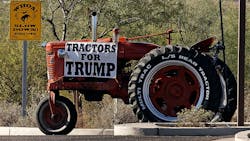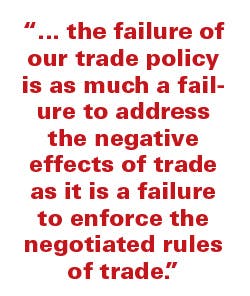The election of Donald J. Trump as the next U.S. president has broken the false dichotomy between free trade and protectionism, launching a new era in U.S. trade policy.
By tapping into the resentment of those left behind -- including manufacturing workers and small and midsize manufacturers -- Trump's election underscored the degree to which the negative effects of free trade policies have been ignored or downplayed. Since his election, some prominent thought leaders who earlier would have reflexively screamed "protectionism" at the slightest defense of trade rules have come around to the idea that changes need to be made.
That moves the debate to even trickier ground. If we're going to fix U.S. trade policy, what needs to be done?
Trump famously focused on the trade agreements and their enforcement. He promised to "pull out of NAFTA," stop the Trans-Pacific Partnership, declare China a currency manipulator and impose large tariffs on countries that "cheat." Such extreme measures raise fears of a trade war in some, and are dismissed as rhetoric by others.
Many reasonable ideas to reset or enforce the rules are now on the table -- many are enumerated in "The Great Manufacturing Employment Challenge," in this issue. Let's push for their consideration instead of a wholesale dismantling of our current free trade policies.
In many respects, however, the failure of our trade policy is as much a failure to address the negative effects of trade as it is a failure to enforce the negotiated rules of trade. Even the fairest free trade policy creates winners and losers. Most thought leaders acknowledge that the benefits of free trade are widespread, while the costs are targeted.
We've known this since we started talking about free trade -- dating back to the 1930s -- but it's most eloquently stated by President John F. Kennedy in a Special Message to the Congress on Foreign Trade Policy: "When considerations of national policy make it desirable to avoid higher tariffs, those injured by that competition should not be required to bear the full brunt of the impact. Rather, the burden of economic adjustment should be borne in part by the Federal Government."
If this election has taught us anything, it's that the biggest threat to achieving the benefits of further globalization is the backlash from the people (and industries) who are paying the price for it. Simply lecturing them about free trade's benefits hasn't -- and won't -- work.
Manufacturers stand to gain from this trade debate reset. Now that the free-trade absolutists are willing to listen, we should push for reasonable changes to and enforcement of current trade rules, along with changes to our tax policy and regulatory system. As well, we should identify and support stronger efforts to help those who bear free trade's costs.
About the Author
Patricia Panchak
Patricia Panchak, Former Editor-in-Chief
Focus: Competitiveness & Public Policy
Call: 216-931-9252
Follow on Twitter: @PPanchakIW
In her commentary and reporting for IndustryWeek, Editor-in-Chief Patricia Panchak covers world-class manufacturing industry strategies, best practices and public policy issues that affect manufacturers’ competitiveness. She delivers news and analysis—and reports the trends--in tax, trade and labor policy; federal, state and local government agencies and programs; and judicial, executive and legislative actions. As well, she shares case studies about how manufacturing executives can capitalize on the latest best practices to cut costs, boost productivity and increase profits.
As editor, she directs the strategic development of all IW editorial products, including the magazine, IndustryWeek.com, research and information products, and executive conferences.
An award-winning editor, Panchak received the 2004 Jesse H. Neal Business Journalism Award for Signed Commentary and helped her staff earn the 2004 Neal Award for Subject-Related Series. She also has earned the American Business Media’s Midwest Award for Editorial Courage and Integrity.
Patricia holds bachelor’s degrees in Journalism and English from Bowling Green State University and a master’s degree in Journalism from Ohio University’s E.W. Scripps School of Journalism. She lives in Cleveland Hts., Ohio, with her family.



